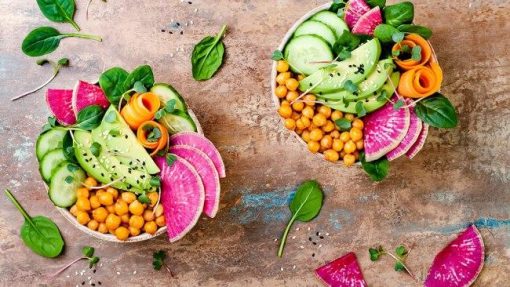What’s the first thing you look for when scanning food labels or perusing the menu at a new cafe? For some, it’s the sugar content or whether the meal is gluten-free, but for a growing number of Aussies, it’s a vegan-friendly guarantee.
Despite Australia’s reputation as a country of meat-eaters (with sausage sizzles and afternoon barbecues deeply woven into our cultural fabric), more and more people are opting to lead a plant-based life. In fact, a recent survey by Roy Morgan Research found that almost 2.1 million of us now choose to eat meat-free and, according to data from Google Trends, Aussies are more interested in learning about vegan principles than they are about the much-hyped keto and Paleo diets.

“People everywhere are excited about vegan food,” says Mo Wyse, co-founder of vegan restaurant Smith & Daughters in Melbourne. “Most pubs now have a [vegan] option and if they don’t, they know they’re taking money out of their own pockets.”
She’s not wrong. According to researchers Euromonitor International, Australia’s packaged vegan food industry will be worth an estimated $215 million by 2020, making it the world’s third fastest-growing behind China and the United Arab Emirates.
“Veganism is no longer a model of deprivation and sacrifice,” explains Dr Matt Ruby, a psychologist at La Trobe University, and a vegan. “Past research has shown that veganism is often referred to as strict, avoidant and difficult, but this image is shifting.”
The many faces of veganism
While advocates of the movement were once written off as radicalised protesters or idealist hippies, today’s vegans take the form of high-profile celebs such as Liam Hemsworth and Natalie Portman, and athletes like Aussie cricketer Peter Siddle.
Even sporting legends like Serena and Venus Williams have talked about going vegan part-time.
It’s a trend that’s also followed by UFC fighter Nate Diaz and spurred on by global campaigns like Meatless Monday and Veganuary (which asks carnivores to go vegan at the start of the year).
Because it’s no longer necessary to conform to all of veganism’s pillars, its stereotypes no longer hold true. At Smith & Daughters – where the vegan symbol is noticeably absent from the all-vegan menu – customers include families, foodies and tradies.
“There’s a lot of construction in the area, so tradesmen come in for their chocolate milk and pies, and they don’t even realise it’s vegan,” Wyse says. “We don’t want to pull the wool over anyone’s eyes, but we don’t want to push the vegan message in a confronting way.”
So what is the vegan message?
While the lifestyle has always been grounded in animal welfare, these days it’s also tied to environmental activism and general wellbeing. “There’s a growing awareness around how food is made. More people are becoming concerned about the impact meat and animal products have on the planet and their health,” Ruby explains.
This awareness is partly thanks to the rise of pro-vegan documentaries like Cowspiracy – which links agricultural farming to climate change – as well as the release of damning scientific studies. Just two months ago, research from Oxford University in the UK revealed that a plant-based diet can reduce your carbon footprint by 73 per cent and free up 3.1 billion hectares of farmland.
“The health benefits of reducing your meat intake are also becoming increasingly well-known,” dietitian Nicole Dynan adds. “Not only are plant-based diets linked to a longer life span, they’re also associated with weight loss and a decreased risk of diabetes, high cholesterol, heart disease and certain cancers.”
That’s not to say going vegan instantly makes you healthier. Faux meats and vegan junk food can be just as unhealthy as their meat and dairy counterparts, and Dynan says you also need to ensure you’re getting the right nutrients (like zinc, protein, iron, omega-3, calcium and B12) to avoid deficiencies.
And it’s important to note that you don’t need to be vegan to be healthy. “The Mediterranean Diet, which is considered one of the healthiest in the world, is mostly plant-based but has small amounts of meat and dairy,” Dynan says.
“Even the Australian dietary guidelines recommend that people eat some lean red meat, poultry or fish each week as they can be very nutritious,” she adds. So while you needn’t go completely plant-based to reap the benefits, thanks to the availability of more and more vegan foods, it’s never been easier to test the waters.
A vegan day on a plate
Hit your nutritional targets with Dynan’s vegan-friendly meal plan.
Breakfast
Scrambled tofu with tomato & avocado on wholegrain toast
Why: “The vitamin C in tomato boosts the absorption of calcium from tofu, and wholegrain bread is a great source of amino acids.”
Snack
Vegie sticks + 1/3 cup hummus
Why: “You’ll score fibre and vitamins from the veg and protein from the hummus.”
Lunch
Burrito bowl with brown rice, black beans, veg & fortified vegan cheese
Why: “Rice and beans make a complete protein and also provide fibre, while fortified vegan cheese adds calcium.”
Dinner
Chickpea curry with veg & quinoa
Why: “The veg provide fibre and vitamins and the quinoa and chickpeas form a complete protein.”


